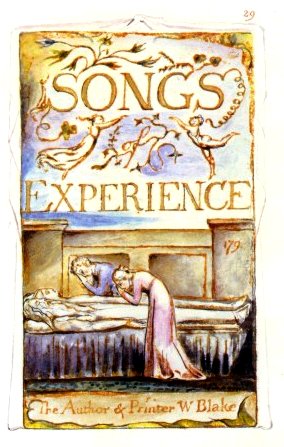I greatly enjoyed engaging with Blake’s Songs of Innocence and Songs of Experience again because I briefly interacted with the poems my senior year of high school. In our discussions about the two collections of poems, I recall us agreeing that the Songs of Innocence had a common theme of innocent aspects of life whereas the Songs of Experience had themes of death and the difficult lessons that life teaches us. However, the poems in the course anthology were poems that I had never read before. The imagery in “Night” reflects many of the themes that I had learned previously, as it describes “green fields and happy groves” and birds “covered warm” (73). “The Little Girl Lost” has equally dark imagery, as it describes “beasts of prey” that come from “cavern deep” (75). The images that I have included below are also the covers of these respective anthologies, which also is a visual representation of the aforementioned themes.
 |
| songs of innocence |
 |
| songs of experience |
“The Miracle of Purun Bhagat” had many interesting allegories to the story of Buddha. In the story of Gautama Buddha, he gives up wealth and fame in order to search for Enlightenment. Just as the previous story from the Jungle Book was an allegory to Genesis, Purun Bhagat is in a position where he can “endow scholarships” in his spare time (84). He also possesses lots of wealth, he even “resigned position, palace, and power” to search for Enlightenment. Ultimately this allegorical methodology makes the story more engaging and enhances the meaning of text. I also felt like there were many thought-provoking parts of the excerpt from Life of Pi. The narrator complains that he has “heard nearly as much nonsense about zoos as I have about God and religion” (97). It seems a major problem with the author’s relationship to animals is not a lack of empathy but instead a lack of knowledge to properly inform that empathy. He notes that “well-meaning but misinformed people think animals in the wild are “happy” because they are “free”” (97). This brings me back to much of the discussion that we had about Earthlings last semester when Bump argued (to my surprise) that vegetarianism is not necessarily the solution to the problems that Earthlings outlines. Instead, a consciousness change is necessary. Just as Ishmael concludes that the only solution is to teach a hundred other people, it seems that Martel is implicitly arguing that the first step to altering the treatment of animals is through changing knowledge (instead of a purely political/behavioral approach).
 |
| buddha |



No comments:
Post a Comment